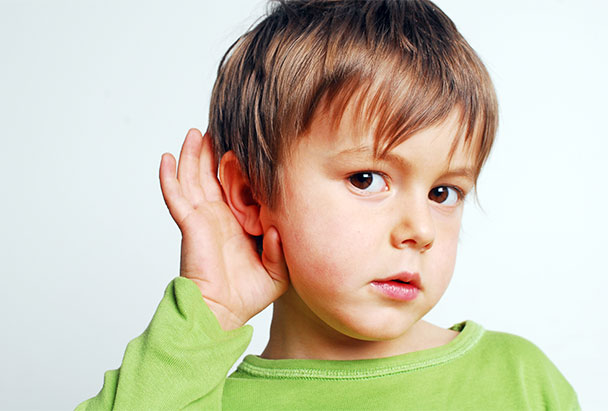
Central Auditory Processing Disorder
(CAPD OR APD)
In 1992, ASHA described CAPD as deficits in the information processing of audible signals NOT attributed to impaired peripheral hearing sensitivity or intellectual impairment. CAPD occurs when the brain is not able to understand clearly, remember correctly or efficiently manage auditory information (i.e.speech). CAPD may exist as either primary or secondary disorders. CAPD may be viewed in relationship to other disorders (i.e. speech or language disorders, attention deficit disorder, dyslexia, learning disabilities, etc.) However, this does not imply that all children with these other disorders will necessarily also evidence a CAPD. There is no known cause for CAPD, however, frequent ear infections may be an underlying factor.
Deficits in central auditory processing may range from mild to severe and may involve a single skill area or a combination of skill areas. Several skill areas have been identified, and they may be known by more than one term. They include but are not limited to:
– Auditory Figure-ground
– Auditory Speech Recognition/Discrimination
– Auditory Closure (including phonetic synthesis and decoding)
– Auditory Memory (including sequencing and organization)
– Auditory Integration
– Auditory Attention
– Auditory Comprehension and Cohesion
If you suspect CAPD, an audiologist can evaluate children as early as age six years old. Some early signs and symptoms of CAPD are:
– History of allergies, frequent colds, or ear infections
– Speech/language delays or poor progress in therapy
– Easily distracted by background noises
– Says huh or what frequently or requires information to be repeated
– Frequently repeats what was said without comprehending it (echolalia)
– Appears pre-occupied or inattentive (daydreams)
– Difficulty following verbal requests/directions
– Slow or delayed responses to verbal requests
– Repeats what is heard, and then slowly shows comprehension (re-auditorization)
– Difficulty with phonics and speech sound discrimination
– Difficulty with reading, spelling and/or writing
– Difficulty with right/left discrimination
– Limited abstract abilities (difficulty pretending)
– Difficulty organizing information
– Difficulty memorizing names and places
– Difficulty remembering words or numbers in sequence
– Exhibits a poor attention span or is easily distracted
– A loner, often plays alone
– Hyperactive, impulsive, or hypoactive
– Behavior problems
What can be done to help children with CAPD?
Once a child has been identified to have a CAPD, the type and severity is classified. Recent research suggests that the neuroplasticity and neuromaturation of the central auditory nervous system is dependent, at least in part on stimulation. Therefore, a comprehensive approach to management of CAPD, including auditory stimulation designed to bring about functional change within the central auditory nervous system, should be undertaken in all cases of CAPD (Chermak & Musiek, 1995). According to Teri Bellis (1996), management of CAPD is children may be divided into three main categories:
1. Environmental modification and teaching suggestions designed to improve the child’s access to auditory information
2. Remediation techniques designed to enhance discrimination, inter-hemispheric transfer of information, and associated neuroauditory functions, and
3. Provision of compensatory strategies designed to teach the child how to overcome residual dysfunction and maximize the use of auditory information
4. Auditory Training therapy comprises the last two management categories, or more simply stated, remediation activities and compensatory strategies that focus on improving a child’s auditory learning and listening skills. This service may be provided by an audiologist or a speech/language pathologist.
